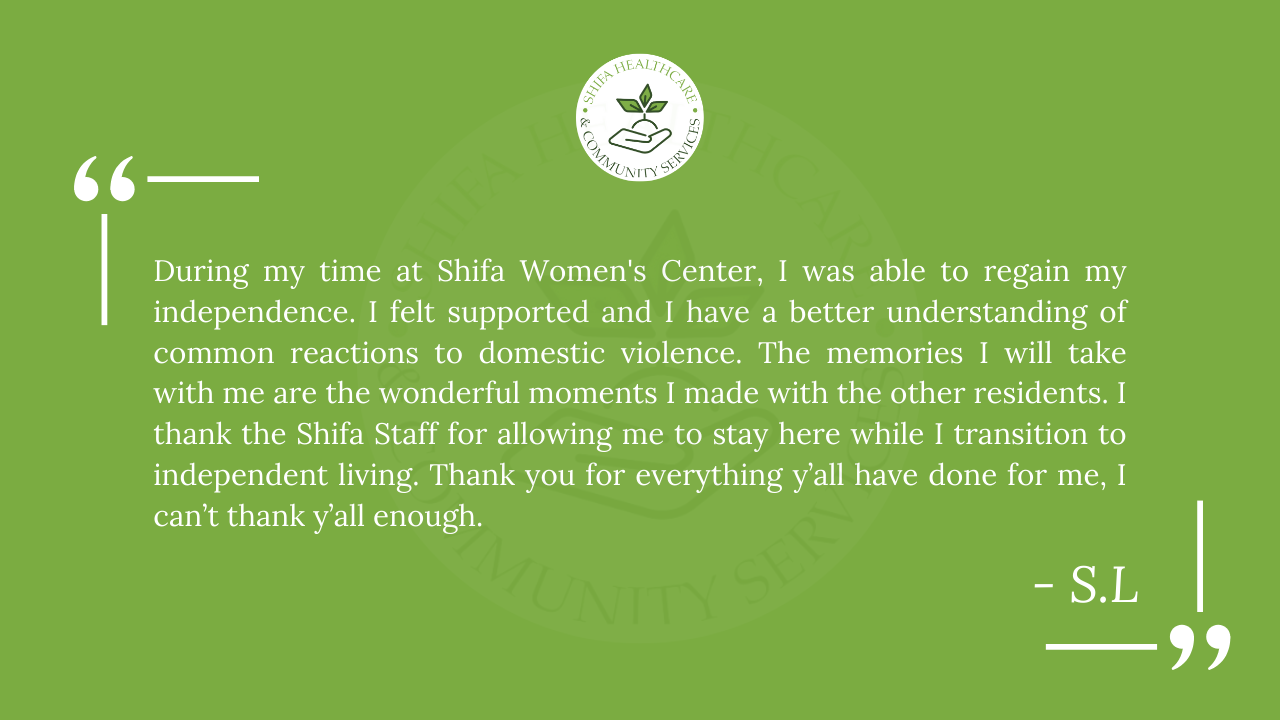Shifa Women's Center - A Safe Haven
In the Greater Houston Area, we have spent over 10 years restoring hope and rebuilding lives for domestic violence survivors.
Shifa Women’s Center in Southwest Houston provides emergency shelter to victims and survivors who have experienced domestic violence, sexual assault and family violence. Houston’s lack of shelter beds for victims of domestic violence is increasing. Shifa Women’s Center is able to offer additional beds for women of culturally diverse backgrounds who need services that are tailored to their needs.

Our Mission

Our Vision
Based on Islamic values of service to mankind, Shifa Woman’s Wellness Health Center USA will be the foremost leader and exemplary organization for providing humanitarian services. We want to empower women and help them to become self-sufficient. The empowerment model is based on creating an environment in which individuals can make their own decisions.
Introduction
An Emergency Shelter for Women and Children
A sanctuary during times of crisis, offering freshly prepared meals, cozy beds, a television lounge, a dining area, personal storage lockers, a children’s activity space, a computer room, a case management area, an interfaith room, and a playground for kids.
SWC is dedicated to delivering high-quality services by implementing efficient systems for intake procedures, closely monitoring the progress of residents, coordinating with licensed therapists, and providing specialized assistance to residents requiring additional or extended support. Through the introduction of new processes, procedures, and IT solutions to streamline administrative tasks, more support staff can now devote their time to helping residents achieve their objectives.
The center was carefully designed to cater to women from diverse cultural backgrounds, offering them and their young children a secure, confidential, and safe environment for healing, recovery, and the restoration of their self-confidence.
Introduction
Frequently Asked Questions
Domestic abuse is typically manifested as a pattern of abusive behavior toward an intimate partner in a dating or family relationship, where the abuser exerts power and control over the victim.
Domestic abuse can be mental, physical, economic or sexual in nature. Incidents are rarely isolated, and usually escalate in frequency and severity. Domestic abuse may culminate in serious physical injury or death.
Anyone can be a victim of domestic violence, regardless of age, race, gender, sexual orientation, faith or class.
Victims of domestic abuse may also include a child or other relative, or any other household member.
Get Help – You are not alone.
With the support of Shifa Healthcare & Community Services Programs many people have survived domestic violence. You can, too.
DOES YOUR PARTNER…
- Embarrass or make fun of you in front of your friends or family?
- Put down your accomplishments?
- Make you feel like you are unable to make decisions?
- Use intimidation or threats to gain compliance?
- Tell you that you are nothing without them?
- Treat you roughly—grab, push, pinch, shove or hit you?
- Call you several times a night or show up to make sure you are where you said you would be?
- Use drugs or alcohol as an excuse for saying hurtful things or abusing you?
- Blame you for how they feel or act?
- Pressure you sexually for things you aren’t ready for?
- Make you feel like there is “no way out” of the relationship?
- Prevent you from doing things you want – like spending time with friends or family?
- Try to keep you from leaving after a fight or leave you somewhere after a fight to “teach you a lesson”?
- DO YOU…
Sometimes feel scared of how your partner may behave? - Constantly make excuses to other people for your partner’s behavior?
- Believe that you can help your partner change if only you changed something about yourself?
- Try not to do anything that would cause conflict or make your partner angry?
- Always do what your partner wants you to do instead of what you want?
- Stay with your partner because you are afraid of what your partner would do if you broke up?



